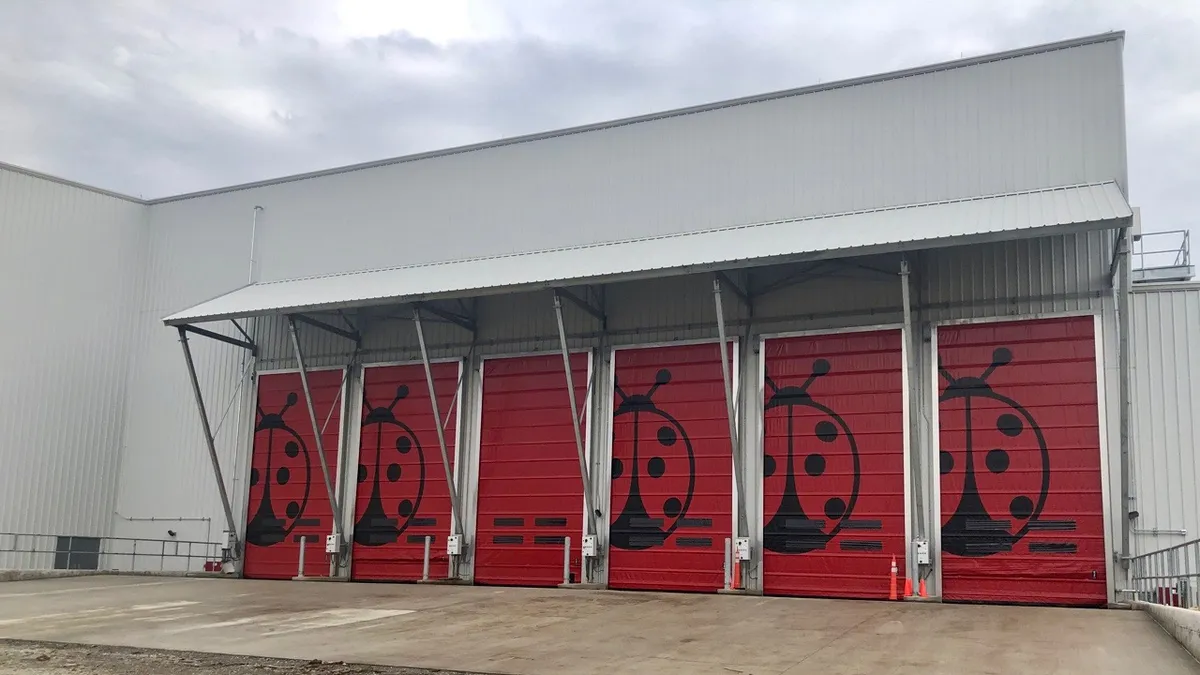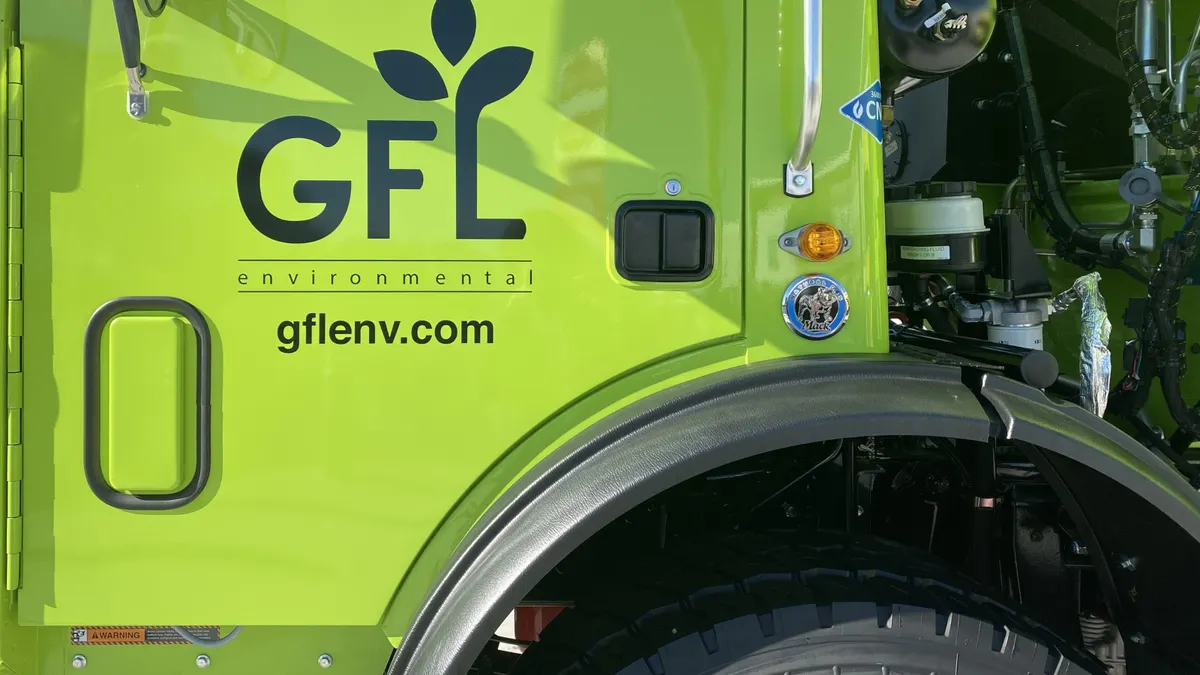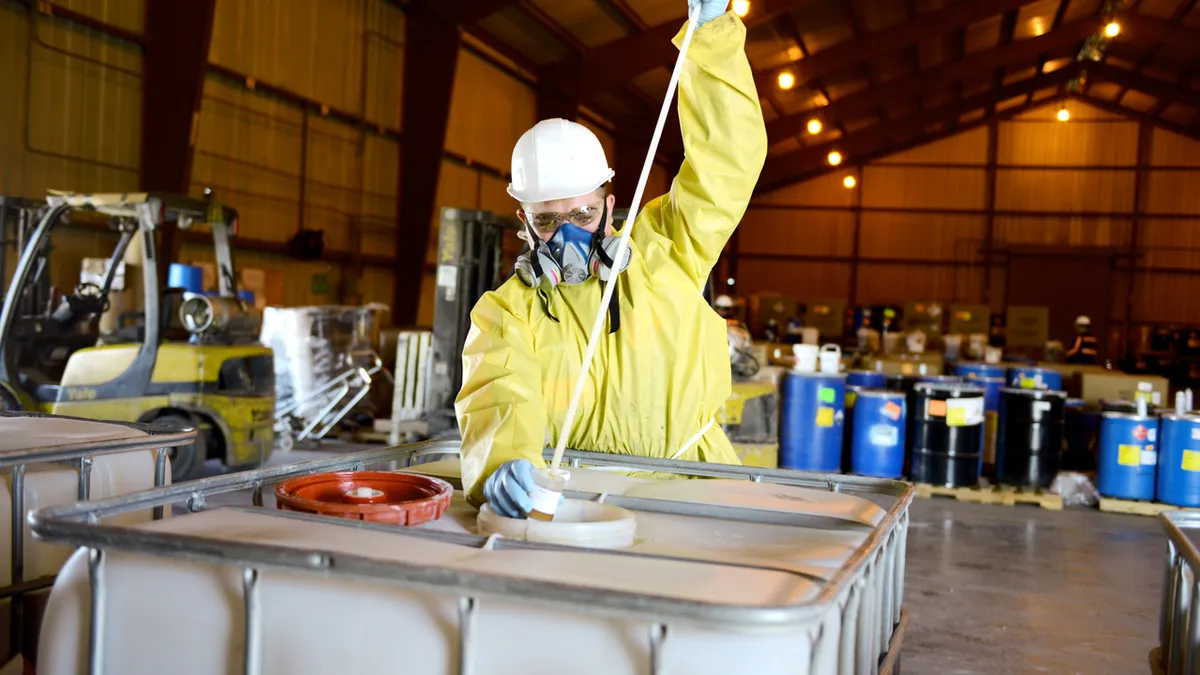Renovare Environmental, a company that once pitched its West Virginia mechanical biological treatment facility and small-scale food waste digester products as a future model for the waste industry, is either on the brink of failure or about to be saved by an acquisition.
In March, the publicly traded company (formerly known as BioHiTech Global) announced plans to acquire Ireland-based Harp Renewables, which sells aerobic digesters that create a fertilizer product, for $20 million. Since then, Renovare has notified local officials that its West Virginia plant will be closed indefinitely, lost representation in litigation with former technology partner Entsorga (an Italian company) and laid off multiple employees. The company has also missed the latest in a series of loan payments, seen its stock delisted from Nasdaq and bottom out below $0.05 per share, stopped servicing digester customers and largely ceased communicating with the public and certain investors.
Last Friday, Renovare announced it is now in talks to be purchased through a reverse merger led by Harp and its affiliate Harp Electric Engineering. Numerous requests for comment from company executives and employees have not yielded responses over the past month. Harp’s U.S. leadership declined to comment.
Ever since it went public in 2015 through a reverse merger, Renovare has reported consecutive net losses, including $24.3 million last year. Its latest annual filing said the company did “not yet have a history of financial profitability” — across either line of business, digesters and MBT. For some people familiar with the company, the recent issues aren’t entirely surprising.
California-based Power Knot was regularly underbid by Renovare for on-site food waste digesters, according to President Iain Milnes, who said "customers were buying product from a nonprofitable company and at an unrealistically low price.” Power Knot recently reported hearing from multiple Renovare customers in need of new microorganisms and spare parts for their digesters, among other issues.
“We know that a large customer prepaid for orders for product from BioHiTech — which we think is of the order of more than half a million dollars — and that product was not delivered to the customer,” said Milnes.
As for the three-year-old MBT facility in Martinsburg, West Virginia, the company that helped design and finance it sees a brighter future. The $33 million plant can process 110,000 tons per year of mixed waste into solid recovered fuel (after recovering certain recyclables) for use in facilities such as cement kilns.
“The Martinsburg facility remains a cornerstone of our North American strategy to deploy large, commercial scale solid waste to SRF facilities in support of the U.S. and Canadian cement industry’s plans to reduce fossil fuels to their kilns,” said Christopher Maloney, CEO for Entsorga’s North American division, in a statement. “Our technology is well proven over decades, and we stand behind the process design and performance as we do with all our installations. We absolutely believe that with the right commercial partners, that Martinsburg can be restarted successfully, and become the industry showcase it was designed to be, and equally important, make money for its investors.”
The backstory
Renovare, known as BioHiTech until last December, initially focused on small-scale aerobic digesters for commercial applications. That line of business has traditionally been its largest source of revenue, but the potential for a new network of MBT facilities was seen as having the potential to disrupt the waste industry in an even bigger way.
While more common in European countries, MBT has yet to take off at scale in the U.S. Years ago, the Entsorga Group set out to bring its proprietary high efficiency biological system (HEBioT) to the U.S. as an alternative to landfill disposal. It settled on Berkeley County, West Virginia, for its project and established a joint venture with Apple Valley Waste Services to begin work on a plant in 2014.
The plan was to capture recyclable metals, create SRF (recognized as an “engineered fuel” by the U.S. EPA) and supply it to nearby Argos Cement to offset the use of coal. The facility was financed through investor capital, as well as $25 million in tax-exempt bonds from the West Virginia Economic Development Authority that Entsorga says were later purchased by pension funds.
BioHiTech entered the mix in 2016, when it announced an agreement to manage a subsidiary that had exclusive rights to roll out the HEBioT technology in the Northeast. Over the following years, through a complex series of transactions, BioHiTech gained and expanded a stake in the Entsorga West Virginia project. This happened in parallel with 2018 deals that saw it partner with private equity firm Kinderhook Industries to acquire hauler Gold Medal Services, which went on to acquire Apple Valley.
At the time, BioHiTech said these plans were “going to help change the paradigm of the industry” and it was eyeing multiple new sites in Pennsylvania and New York. Some of those plans didn’t pan out, and construction delays occurred in West Virginia, but the company finally opened its first facility in 2019. That year, it became the largest owner of the Martinsburg operation and sold its minority share in Gold Medal.
Kinderhook did not respond to requests for comment clarifying whether it still has any financial relationship with Renovare. Gold Medal, which was utilizing the facility for local waste until recently, said it no longer has any financial relationship with the company.
Around this time, BioHiTech “systematically began to reduce Entsorga’s access to the plant and any operational data,” according to the Italian company, but was still cooperating for publicity. According to P. Cella Mazzariol, president of parent company EntsorgaFin, over 300 delegations visited the plant during 2019 and 2020 to learn more about the European technology.
The onset of the pandemic in 2020 affected BioHiTech’s digester customers (such as Carnival Cruises) and records show the company received a $421,300 loan through the Paycheck Protection Program, but bigger issues were developing.
That year, permits for a second facility in Rensselaer, New York, were ultimately denied by the state’s Department of Environmental Conservation, despite appeals. According to comments at a WasteExpo 2021 panel from Emily Dyson, then-vice president of science research and development (who is no longer employed with Renovare), the company was within “literally two hours of getting our permit” before the governor’s office weighed in. During the fourth quarter of 2021, the company decided to abandon its plans for this site.
At the time, Dyson expressed optimism in finding another site within New York or West Virginia, because “they realize now that coal is not going to be the thing that sustains them." The company lobbied for a law passed in West Virginia that year (SB 368) to eliminate solid waste fees for mixed waste processing facilities and state officials said they hoped to see more built.
The pandemic affected operations in Martinsburg as waste volumes fluctuated. The Argos facility also reduced demand, including shutdowns for various maintenance reasons, which affected revenue. Argos did not respond to a request for comment. In the summer of 2021, BioHiTech entered into an agreement with Lone Cypress Energy Services to evaluate uses for the SRF product and other potential HEBioT projects. Lone Cypress did not respond to a request for comment.
BioHiTech previously said it was looking at ways to use the fuel in hydrogen production, slag coal blending or as a feedstock for bioplastics, among other options, but issues were mounting. In August 2021, during BioHiTech’s last known earnings call, CEO Anthony Fuller (a former Walmart executive) said “there's no way that we are going to communicate that we're comfortable” with the financial performance of the site. The company soon recorded impairment expenses of nearly $10.73 million due to the expiration of a technology license without an available project commencing, issues at Martinsburg and abandonment of the Rensselaer project.
Renovare reported a working capital deficit of nearly $41.82 million through 2021, including a state bond for the Martinsburg facility for which it had not met certain covenants, senior secured notes for which it had not met certain covenants and junior unsecured notes from Entsorga for which it had defaulted on scheduled payments. It raised nearly $9.68 million in outside funding around this time, but was still behind.
Entsorga says it continued to offer remote technical assistance and deferred multiple payments owed from construction, but by the beginning of this year the Renovare team had cut off communications and paused operations at Martinsburg as part of a strategic review.
EntsorgaFin sued the company in federal court on Feb. 25 this year, citing more than $1.1 million in owed payments, and has been working to get its name off the facility. The case remains pending. The firm representing Renovare recently removed itself for unspecified reasons and did not respond to a request for comment. Renovare recently settled another case brought by a New York electrical company over $175,000 in owed payments.
Along the way, Renovare was put on notice by Nasdaq for not paying a listing fee or maintaining a minimum $1 stock price and recently moved back to trading on a tier of the OTC Markets. It also missed additional loan payments and reported a net loss of $3.37 million for the first quarter of this year — along with $1.1 million in revenue.
In April, the company sent a letter to the Berkeley County Solid Waste Authority (which owns the land for the Martinsburg plant) saying it was exploring multiple ways to revive the site, including “obtaining additional financing from third parties.” Clint Hogbin, chair of the authority, said communication has been very limited in the wake of this closure. The county has other options for disposal — including nearby transfer stations and a WM landfill for comparable prices — but hopes to see the facility reopen.
What’s next
The market for organics recycling or disposal alternative technologies has seen a surge of activity in recent years amid a growing number of state and local policies, as well as interest from sustainability-focused investors. Multiple companies are also looking to gain market share through on-site solutions that limit the need for trucks. The MBT concept is also still seen as a promising one by many experts, given the heightened focus on methane emissions from landfills.
Yet it remains to be seen if Renovare’s financial track record can attract further interest.
Beyond discussion of the Harp merger, Renovare has given little indication of its financial strategy. Given that LinkedIn and other sources have indicated multiple Renovare layoffs in recent weeks (with some West Virginia facility employees reportedly let go months ago) it’s unclear how many of the company’s 30-plus employees are even left. Fuller and Chief Financial Officer Brian Essman have still been signing recent financial filings.
Two outside advisors from the company Climate Commodities, who now hold positions as interim board chair and transition advisor and are believed to be playing a key role in current discussions, have not responded to requests for comment. Financial analysts who have been listed as covering Renovare within the past year declined or did not respond to requests for comment.
A March presentation from Renovare said acquiring Harp could help expand the company’s geographic reach and product offering, leading to “significant top line and cash flow growth,” but no similar update has been given following the reverse merger announcement. The company previously estimated the addressable market for its digesters to be as large as 200,000 units worldwide — including customers in “the maritime sector as well as retail, healthcare, government, hospitality, education, food service.”
Under newly announced terms, which involve a reverse stock split, Harp’s shareholders would own 84% of the company. The transaction could close by Sept. 2 and has an $850,000 termination fee.
On June 30, Renovare released a delayed quarterly filing that reported a new forbearance agreement to delay certain debt payments until 2023 as well as new a private placement with “several investors” that helped raise a small amount of funding in early June.
As for the West Virginia facility, which does not appear to be a clear fit with Harp’s model, Entsorga still owns a 10% stake in the joint venture and is “currently in discussions with multiple investors and other interested parties regarding the potential to acquire the asset.” Maloney said he’s fully confident it can be viable by identifying a more diverse range of offtake partners for the SRF product.
“We have all the pieces to be able to start again,” said Maloney. “Continuing to bury solid waste in landfills when we have the means to recycle and repurpose it sustainably, while simultaneously reducing our carbon footprint, makes no sense.” He pointed to a 2021 pledge by major concrete and cement manufacturers to achieve “net zero” emissions by 2050 as a key market driver, as that sector’s greenhouse gas emissions have grown dramatically in recent decades.
Whatever happens next, time is limited. On May 26, West Virginia’s Department of Environmental Protection communicated that the operator “must resume operations on or before October 4, 2022 or begin permanent closure of the facility.”
This piece has been updated to include information from Renovare’s newly released first-quarter filing.



















